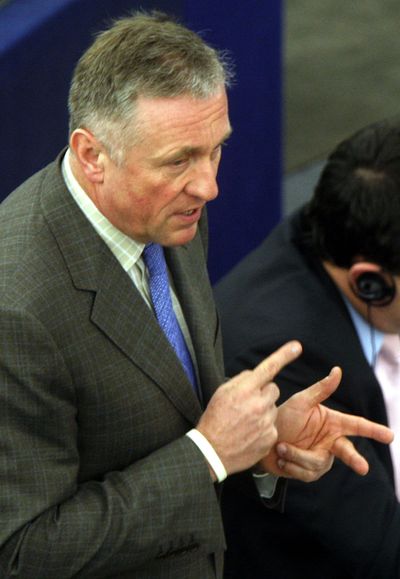E.U. head blasts U.S. economic strategy
Stimulus package called ‘road to hell’

BERLIN – The president of the European Union on Wednesday ripped the Obama administration’s economic policies, calling its massive deficit spending and bank bailouts “a road to hell.”
The comments by Prime Minister Mirek Topolanek of the Czech Republic, which holds the E.U.’s rotating presidency, startled some U.S. and European officials, who are preparing for President Barack Obama’s visit next month to several European cities, including Prague, the Czech capital.
In an address to the European Parliament in Strasbourg, France, Topolanek abandoned diplomatic niceties and blasted Washington for approving a $787 billion economic stimulus package, which he said encouraged “protectionist” trade policies. He said the overall U.S. strategy for ending the recession would flood global markets with too many dollars and lead to bigger problems.
“All of these steps, these combinations and permanency, is the road to hell,” Topolanek said. “The United States did not take the right path.”
Topolanek’s critique came one day after his government was toppled by a no-confidence vote by opposition lawmakers in the Czech Parliament. Although he will remain prime minister for the time being, his shaky position at home raised questions about whether he could remain effective as the E.U. president until his country’s six-month term expires at the end of June.
“I think this was just an attempt to show he’s a force still to be reckoned with and not a walking-dead politician,” said Katinka Barysch, deputy director at the Center for European Reform, a London research organization. “For him to come out with his guns blazing does seem a bit odd.”
Topolanek’s words, however, underscored a fundamental divide that persists between the United States and many European countries over the best way to respond to the global financial crisis.
U.S. officials have pressed their European counterparts to spend substantially more public money in an attempt to revive economic growth and global trade. Some countries, led by Germany, have strongly resisted, predicting that such a path could lead to unsustainable debts and runaway inflation.
Luxembourg’s prime minister, Jean-Claude Juncker, who heads a coordinating body of countries that use the euro currency, said European countries had already spent enough to jumpstart their economies.
“The European stimulus plans are muscular, they are demanding, they are important in volume and in quality,” Juncker said Wednesday in an interview with France’s Europe 1 Radio. He said there was “no question” that the European Union would reject requests from Obama to spend more.
Obama begins his transatlantic mission next week with a stop in London for a summit of the Group of 20 leading industrialized countries. Many European leaders have said the primary goal of the summit should be to impose greater regulation and oversight on global financial markets, instead of more government spending. But the 27 member countries of the European Union have had difficulty expressing themselves with a single voice.